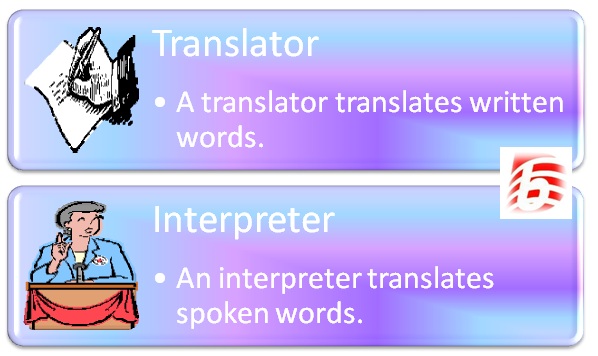Interpreter vs Translator
Although the terms interpreter and translator may seem similar, there is indeed a difference between the two. Before examining the distinction between them, let’s explore what each term signifies and their characteristics. Both interpreter and translator are nouns, with the former being the noun form of the verb “interpret” and the latter being the noun form of the verb “translate.” A key difference between an interpreter and a translator is that an interpreter translates spoken words, while a translator translates written words.
Who is a Translator?
According to the Oxford English Dictionary, a translator is “a person who translates from one language into another, especially as a profession.” A translator must possess strong linguistic skills and have a solid understanding of grammar, enabling them to effectively express the thoughts presented in the language they are translating. The job of a translator does not typically require special skills, as they usually work in their native language. A translator has ample time to translate written words and can reference books, grammar texts, and research materials as needed.
Who is an Interpreter?
The Oxford English Dictionary defines an interpreter as “a person who interprets, especially one who translates speech orally or into sign language.” An interpreter must translate spoken words based on their grammatical knowledge of the source language and their expertise in the subject matter, making their job more challenging. Unlike a translator, an interpreter requires unique skills because they must interpret orally and on the spot most of the time.
What is the difference between Interpreter and Translator?
Translation focuses on expressing the original writer’s thoughts in another language, while interpretation aims to convey the speaker’s message in another language. The main differences between the two are as follows:
- A translator translates written documents, while an interpreter translates spoken words.
- Since a translator deals with writing, they should have a strong knowledge of the target language (the language they are translating to).
- An interpreter faces a more challenging job because they must translate on the spot.
- A translator can consult other sources for assistance, while an interpreter must rely on the knowledge stored in their mind.
Although a translator’s job may seem easier than that of an interpreter, this does not diminish the responsibility each professional holds for their work. Both interpreters and translators have an equal level of responsibility.
Key Takeaways
- Interpreters translate spoken words, while translators work with written words.
- Translators have more time and resources to complete their work, while interpreters must rely on their existing knowledge and work on the spot.
- Although their jobs differ in terms of difficulty, both interpreters and translators have an equal level of responsibility for their translations.
